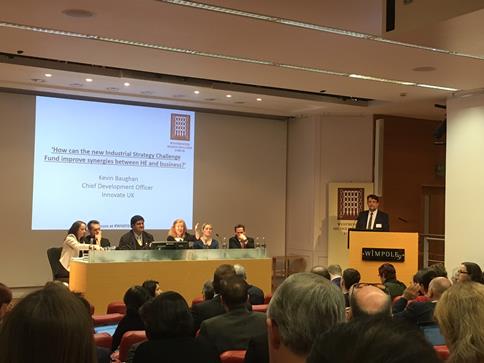
Kevin Baughan, chief development officer at Innovate UK, addressing delegates at a Westminster Higher Education Forum yesterday on UK science funding and policy.
By Michael Banks
I headed to London yesterday for an event on the future of UK science and innovation funding and policy that was organized by the Westminster Higher Education Forum.
Held at the Royal Society of Medicine, the meeting was attended by representatives from government, business and academia. It was impeccably timed given that the “Brexit bill” is currently going through parliament and the UK government recently published an industrial strategy together with the announcement of an additional £4.7bn for R&D.
While it is safe to say that the UK is a scientific powerhouse, the same cannot be said of its ability to translate research into products and services, something that the new industrial strategy aims to tackle.
Kevin Baughan, chief development officer at Innovate UK – a public body that works with companies to boost innovation – says one reason for this is that many businesses don’t know how to tap into the UK’s science base, while IP attorney James Cross from Maucher Jenkins, showed that the UK is far behind its EU counterparts when it comes to filling patents.
Simon Andrews, executive director of Fraunhofer UK Research, says that while he is “enthused” by the industrial strategy, it will take time to reap the benefits. “The success we have seen in Germany [in innovation] is based on 60 years of experience, so we need time,” he says.
Andrews points to the photonics industry, of which the Fraunhofer is a playing its part through the Fraunhofer Centre for Applied Photonics in Glasgow. He says photonics is as big as the pharmaceuticals and space sectors and calls the iPhone a “photonic device” that requires a global supply chain and many different types of materials to build. “Niche innovations have enormous value, but only if we open to global trade,” he says. “We need to think long term, and that any new money is used carefully.”
Many of the speakers highlighted the uncertainty around Brexit, including whether the UK will be involved in future EU research programmes and how well the country will be able to attract investment from overseas.
Indeed, Martin Szomszor, a consultant data scientist at Digital Science, showed how UK scientists are increasingly collaborating with their European counterparts.
He told delegates that the percentage of research performed in the UK together with international collaborators is now around 60%, most of which is bilateral, particularly with US scientists. Yet the number of collaborations with Germany and France is now increasing at a faster rate than with US scientists, which he says is possibly due to major EU programmes such as Horizon 2020.
Despite some of the gloom, there was also optimism that the UK should seek out new partners when it comes to research and innovation. “We need to forge new collaborations beyond existing borders,” says Rebecca Lumsden, head of science policy at the Association of the British Pharmaceutical Industry. “We need to look on [Brexit] as a challenging opportunity.”
Guidelines
Show/hide formatting guidelines
this text was deletedwhere people live in harmony with nature and animals</q>
Some text